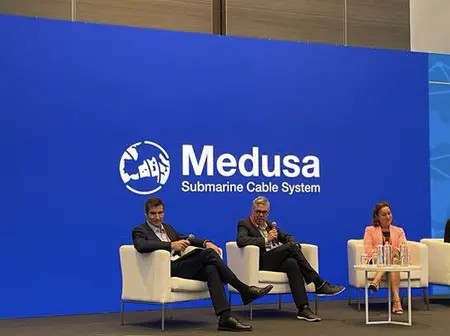In the vast expanse of the Atlantic Ocean, a new digital artery is being envisioned—a subsea cable that could redefine Africa’s connectivity. The Medusa submarine cable system, currently under construction to link Europe and North Africa, is now eyeing a significant expansion. With backing from the U.S. Trade and Development Agency (USTDA), a feasibility study is underway to extend this high-capacity fiber-optic network along Africa’s Atlantic coastline. If realized, this project promises to bridge digital divides, stimulate economic growth, and position Africa as a central node in the global digital ecosystem.
The Medusa system is an ambitious infrastructure project designed to enhance connectivity between Europe and North Africa. Spanning over 8,700 kilometers, the cable will feature 24 fiber pairs, each capable of transmitting 20 terabits per second. The system is set to have multiple landing points across countries including Portugal, Morocco, Spain, France, Algeria, Tunisia, Italy, Libya, Greece, Cyprus, and Egypt.
Funded by AFR-IX Telecom, Orange, and the European Union through the Connecting Europe Facility (CEF) Digital programme, Medusa aims to provide open-access, high-speed internet to underserved regions. Orange is responsible for landing the cable in several countries, including France, Tunisia, and Morocco.
The U.S. government’s involvement through the USTDA introduces a layer of geopolitical strategy to the project. By funding a feasibility study to extend Medusa along Africa’s Atlantic coast, the U.S. aims to promote the use of American suppliers and standards in the region’s digital infrastructure. This move is seen as part of a broader effort to counterbalance other international influences in Africa’s telecommunications sector.
The study will assess the technical and commercial viability of the extension, with a focus on ensuring secure and trusted connectivity. The involvement of U.S. firms in the project could also open avenues for American companies to participate in the construction and operation of the expanded network.
AFR-IX Telecom, a key player in the Medusa project, is spearheading efforts to enhance Africa’s digital infrastructure. The company has secured significant funding from the European Commission to support the expansion of the Medusa Africa Submarine Cable System. This initiative aims to connect Southern Europe with Atlantic Africa, preparing for a 24-fiber pair cable and branching units.
By focusing on open-access infrastructure, AFR-IX Telecom seeks to democratize internet access, fostering economic and technological development across the region. The company’s efforts align with broader initiatives to reduce the digital divide and promote sustainable development in Africa.
The proposed extension of the Medusa cable along Africa’s Atlantic coastline holds significant promise. It could provide high-speed internet access to underserved regions, stimulate economic growth, and enhance global connectivity. However, several challenges must be addressed to realize this vision.
Geopolitical considerations play a crucial role. The involvement of multiple international stakeholders introduces complexities related to regulatory approvals, security concerns, and alignment of strategic interests. Additionally, the technical feasibility of extending the cable to various African countries requires careful planning and coordination.
Financially, securing the necessary investments for the extension poses another hurdle. While the USTDA’s feasibility study is a positive step, substantial funding will be required to construct and maintain the expanded network. Public-private partnerships and international collaboration will be essential to mobilize the needed resources.
As the feasibility study progresses, the future of Africa’s digital landscape hangs in the balance. The successful extension of the Medusa cable could serve as a catalyst for broader digital transformation across the continent. It could pave the way for increased internet penetration, improved access to information and services, and enhanced participation in the global digital economy.
However, the path forward is fraught with challenges. The complexities of international collaboration, regulatory hurdles, and financial constraints must be navigated carefully. The outcome will depend on the ability of all stakeholders to align their interests and work towards a common goal.
In conclusion, the Medusa submarine cable’s proposed extension along Africa’s Atlantic coast represents more than just a technological endeavor. It embodies the aspirations of a continent striving to bridge its digital divide and integrate more fully into the global digital economy. Whether this vision becomes a reality will depend on the collective efforts of governments, private sector players, and international partners committed to building a connected and inclusive digital future for Africa.

Leave a Reply